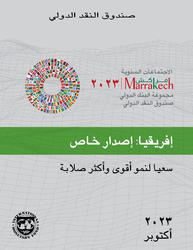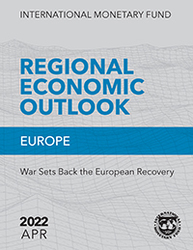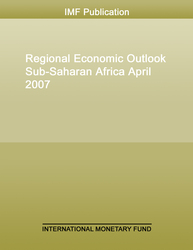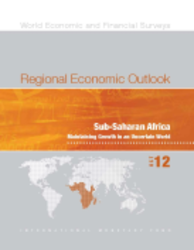No book found.

Africa: Special Issue, October 2023: In Pursuit of Stronger Growth and Resilience
On the occasion of the World Bank-IMF Annual Meetings’ return to the African continent after 50 years—specifically to Marrakech, Morocco—this Special Issue on Africa discusses economic developments for the entire continent.
Publication date: October 2023
ISBN: 9798400254772
$20.00
Add to Cart by clicking price of the language and format you'd like to purchase
Available Languages and Formats
| Arabic | |||
| English | |||
| French |
Prices in red indicate formats that are not yet available but are forthcoming.
Topics covered in this book
This title contains information about the following subjects.
Click on a subject if you would like to see other titles with the same subjects.
Inflation , Economics- Macroeconomics , International - Economics , Natural Disasters , Africa economic conditions , Africa economic forecasting , Africa economic developmen , Africa economic policy , IMF financing arrangement , food-price inflation , international community , near-term inflation expectation , green transition , Africa-In pursuit , state conflict , Inflation , Natural disasters , Africa , Global , North Africa , Sub-Saharan Africa
Summary
On the occasion of the World Bank-IMF Annual Meetings’ return to the African continent after 50 years—specifically to Marrakech, Morocco—this Special Issue on Africa discusses economic developments for the entire continent. After four years of crises and at the close of another difficult year, recent events, including the devastating earthquake in Morocco, severe floods in Libya, and the impact of Cyclone Freddy in Malawi, have underscored the continent’s ongoing vulnerability to natural disasters and the need to build resilience. In the near term, there are tentative signs that the outlook in many countries in Africa is improving. Inflation is generally easing, economic activity is starting to pick up, and fiscal imbalances are gradually moderating. However, significant challenges remain, and it is too early to celebrate. For too many countries, inflation is still too high, debt vulnerabilities remain elevated, and medium-term growth rates are too low. Recent episodes of political instability also underscore the fragility of conflict-affected states. Against this background, Africa’s policymakers should prioritize efforts to boost resilience by ensuring macroeconomic stability and accel-erating structural reforms to foster stronger, more inclusive growth. The international community should maintain and enhance a cooperative approach to the provision of global public goods. In the case of Africa, it is essential to support the region’s most vulnerable climate- and conflict-affected states.
Copyright © 2010 - 2026
Powered by:
AIDC



